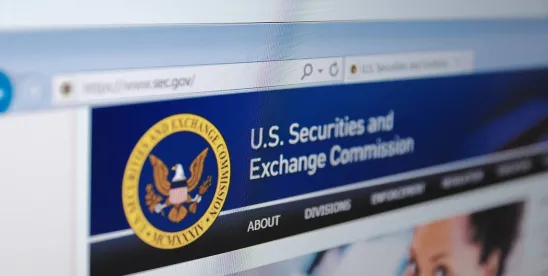In Securities and Exchange Commission v. Jarkesy, No. 22-859, 2024 WL 3187811 (U.S. June 27, 2024), the United Stated Supreme Court (Roberts, C.J.) held that when the Securities and Exchange Commission (“SEC”) seeks civil penalties against a defendant for securities fraud, the Seventh Amendment of the United States Constitution entitles the defendant to a trial by jury. This decision was based upon the Court’s interpretation that the SEC’s antifraud provisions replicate common law fraud, and thus actions for violations of these provisions implicate the Seventh Amendment right. The Court determined that the “public rights” exception, which allows certain matters to be resolved outside of Article III courts without a jury, does not apply in this context because the action does not fall within the distinctive areas involving governmental prerogatives traditionally resolved without Article III adjudication. This ruling curtails the SEC’s authority to impose penalties for fraud, and could potentially affect the enforcement capabilities of agencies enforcing federal law.
The case involved Texas-based hedge fund manager George Jarkesy and his firm, Patriot28, LLC against whom the SEC initiated an enforcement action for alleged violations of federal-securities laws in connection with the launch of two hedge funds. The SEC adjudicated the matter in-house and an administrative law judge determined that Jarkesy and his firm committed securities violations under Securities Act of 1933, Securities Exchange Act of 1934, and Investment Advisers Act of 1940, and levied a civil penalty of $300,000. In the Matter of John Thomas Cap. Mgmt. Grp. LLC, d/b/a Patriot 28 LLC; & George R. Jarkesy, Jr., Release No. 5572 (Sept. 4, 2020). The defendants filed a petition for judicial review. Jarkesy v. Sec. & Exch. Comm’n, 34 F.4th 446 (5th Cir. 2022). The Fifth Circuit granted the petition and vacated the SEC’s order on the ground that adjudicating the matter in-house violated the defendants’ Seventh Amendment right to a jury trial. Id. The Fifth Circuit denied rehearing en banc, 51 F.4th 644 (2022), and the Supreme Court granted certiorari, 600 U.S. ___ (2023).
In a 6-3 decision, the Supreme Court affirmed the Fifth Circuit’s ruling. The Court’s analysis was twofold. First, it considered whether the action implicates the Seventh Amendment, concluding that it does because the remedy sought by the SEC (civil penalties) is legal in nature and can “only be enforced in courts of law.” Civil penalties are designed to punish or deter rather than merely restore the status quo. Second, the Court addressed whether the public rights exception applies, concluding that it does not because the SEC’s action involves a matter of private right rather than public right, and thus requires adjudication in an Article III court with a jury trial.
The Court relied heavily on its analysis in Granfinanciera, S.A. v. Nordberg, 492 U.S. 33 (1989), which held that the Seventh Amendment protected the right to a trial by jury in all cases in which a legal right, as opposed to an equitable right, was at issue. In Granfinanciera, the Court considered whether the Seventh Amendment guarantees the right to a jury trial “in the face of Congress’ decision to allow a non-Article III tribunal to adjudicate” a statutory “fraud claim.” At issue was whether Congress’s designation of fraudulent conveyance actions as “core [bankruptcy] proceedings” authorized non-Article III bankruptcy judges to hear them without juries. Considering the remedy these suits provided, the Court concluded that fraudulent conveyance actions were “quintessentially suits at common law” and not “closely intertwined” with the bankruptcy process. Thus, the Court held that the public rights exception did not apply and a jury was required. Focusing on the “substance of the suit,” the Court in Jarksey stated “Granfinanciera effectively decides this case.” “Congress cannot ‘conjure away the Seventh Amendment by mandating that traditional legal claims be . . . taken to an administrative tribunal.’”
Justice Gorsuch filed a concurring opinion, joined by Justice Thomas, emphasizing the importance of the separation of powers and the protections provided by Article III, the Seventh Amendment, and due process.
Justice Sotomayor filed a dissenting opinion, joined by Justices Kagan and Jackson, arguing that the majority’s decision disregards longstanding precedent, undermines established government practice, and encroaches on Congress’s constitutional authority. The dissent criticized the majority for its interpretation of the public rights doctrine and its departure from precedent without adequate justification.
Congress has passed over 200 statutes authorizing federal agencies to impose civil penalties for violations of statutory obligations. This ruling prompts concerns about the possibility of challenges to other federal agencies’ internal enforcement capabilities, particularly in cases seeking civil penalties. By seeking to delineate the boundaries of the separation of powers, the Court may have instead obscured them, as agencies navigate the delicate balance of internal administrative authority. This decision may lead to an influx of case filings in federal courts even when agencies opt to adjudicate matters administratively, as respondents seek to pursue their right to a jury trial in situations where such a right was not previously explicitly recognized.




 />i
/>i

